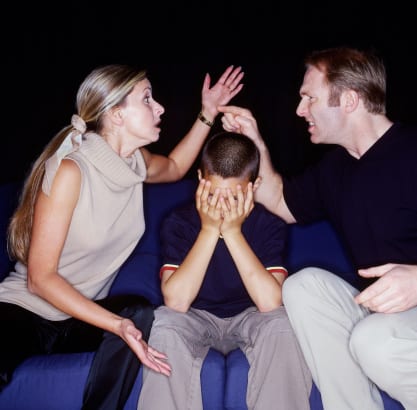Given that one in two marriages in the U.S. end in divorce, many parents are faced with the dilemma of how to make the experience for their children manageable instead of overbearing.
No child wants their parents to be separated or divorced, so when it happens, there is a lot of stress for the child as well as the parent. Children can have a tendency to think that relationship breakdown is their fault, they can internalize their parents’ arguments or concerns, and have many other reactions to a divorce or separation.
Just like an adult grieves the end of a relationship, children can grieve the relationship with an absent parent as well. So although separation or divorce can be one of the most stressful and horrible events in a parents’ life, every effort should be made to be as amicable as possible with the other parent.
Parents who get divorced or separated can have a tendency to become consumed in the separation of (assets, pets, house, even the children) and let the kids see or witness disagreements, arguing, fighting or worse. When this happens children can react to the parents non-communication by becoming aggressive, involved in negative behaviors to bring attention to themselves, or even worse begin using drugs, alcohol or hanging with negative crowds.
Part of role modeling as a parent is to let children see “fair” disagreements (if they have to see it at all). Parents should try to be civil even when disagreeing, try not to show meanness toward or scream at each other, or talk negatively about each other in front of their children.
Children can sometimes feel that they have to choose sides when parents argue, which can make for a disaster in their personal and social lives when dealing with the pressure. That pressure can put extreme stress on a child, especially when their parents are not keeping them out of the disagreements, using the child against each other or simply not handling the divorce or separation, with the child in mind.
It is easy to get caught up in the moment and look out for ourselves during such a turbulent time. Divorce and separations are hard for anyone and devastating to the ego, emotional and mental state. But parents still have to be cognizant of their efforts to prove their point with their spouse and children. They need to do this while shielding their children from present and future trauma.
Here are some ways for parents to keep children protected during a divorce:
- Have a neutral place for discussing disagreements, divorce, etc, away from the children (like the car, leave the house, go for a walk, take children to a family member or a friend’s house so parents can talk in the house).
- Parents should agree to talk calmly in front of children, even when angry.
- Parents should agree that they will not talk about the other to or around the children.
- Parents should allow for the other to express their feelings without arguing (using a mediator if necessary).
- Parents (together if possible) should assure the children that nothing besides the address of one of the parents will change…then stick to that promise. Children want to know that their lives will not be upside down, they need stability so as parents we need to promise that stability.
- Parents should agree that they will not introduce another person into the children’s life without speaking to the other first, so everyone is on the same page. Again, if parents respect each other and their children, this can happen and it can allow the children to deal with a new person in the parents’ life a little easier.
Every household has its system and all parents have disagreements, but it’s the way we handle them that will make all the difference in how our children will respond..
What ways have you and your ex used to keep disagreements “fair” and keep children neutral?





